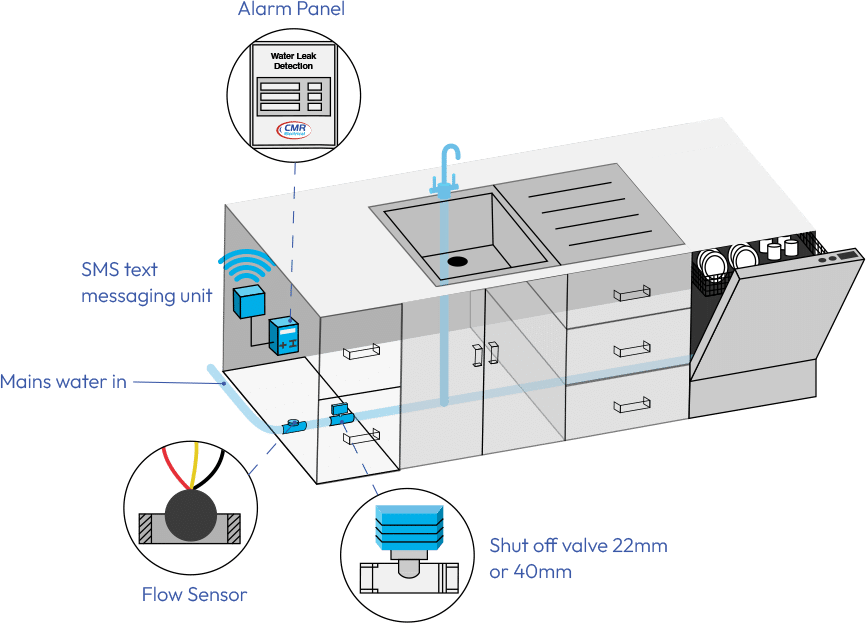Blog
Do Flow-Based Leak Alarms reduce Water Pressure?
Introduction to Water Pressure:
Water pressure is the force that makes water move through pipes. It also controls how fast it comes out of taps and plumbing fixtures. When your water pressure is low, it can significantly affect the quality of living in your home. Everything from showering and washing dishes to doing the laundry will take longer. But if the water pressure is too high, it can wear out plumbing fittings faster and cause leaks. One method of monitoring water flow in your home is to install a flow-based leak alarm. This leak alarm is connected to your incoming water supply. However, some people are concerned that installing a flow-based leak alarms will reduce water pressure. This article will explore this issue and help you change your water usage and potentially reduce your water bill.

Factors affecting Water Pressure:
There are many factors that will affect water pressure. Understanding this will help you to manage and improve water pressure at your property:
- The height of the reservoir or water tower is a crucial factor in determining water pressure. It influences the elevation of the water source relative to your property. The higher the source, the greater the potential energy available to push water through the pipes.
- Property Elevation: Your property’s elevation in relation to the water source can also impact water pressure. Homes situated at the top of a hill may encounter lower water pressure. This is because the gravitational force needed to push water upwards can affect pressure.
- Demand Fluctuations: Water pressure can vary throughout the day based on water demand. Peak times, such as mornings and early evenings, can lead to lower pressure due to increased usage.
- Extended dry spells and frequent use of hosepipes and sprinklers for gardening can strain water supply systems. This strain often leads to a decrease in water pressure.
- Pumping Facilities: Inadequate pumping facilities in the distribution network can contribute to low water pressure.
- Mains Size and Network Issues: Low water pressure can be attributed to factors such as small water mains. Issues like leaks, equipment failures, or blockages within the distribution network can also contribute to this problem.

Measuring Water Pressure:
Water pressure is typically measured using different units:
- Bar: 1 Bar is the force needed to push water up 10 meters. The average water pressure in the UK ranges between 2 and 4 Bar.
- PSI (Pounds per Square Inch): 1 Bar is equivalent to 14.5 PSI. PSI is another common unit for measuring water pressure.
- MPa (Megapascal) is typically linked with high-pressure systems such as hydraulics. It’s important to note that 1 Bar is equivalent to 0.1 Megapascal.
What are Flow-based Leak Alarms?
Flow based leak alarms work by continuosly monitoring both the volume and amount of time water is moving through pipes. The illustration below depicts the wiring of the leak alarm to a water flow sensor. This setup allows for the comparison of water volumes against predetermined thresholds. If the water flow rate surpasses the pre-determined amount, the panel triggers the activation of a shut-off valve. This shut-off valve effectively cuts off the water supply to the respective area.
By promptly fixing leaks, individuals can prevent unnecessary water wastage and the associated financial costs. Additionally, the awareness generated by these alarms encourages users to adopt more water-conscious behaviors. Users become more attuned to their water consumption habits, leading to a proactive approach in minimizing water waste. This heightened awareness, combined with the quick response facilitated by the alarm system, empowers individuals to take control of their water usage, resulting in reduced consumption and ultimately contributing to lower water bills. The integration of flow-based water leak alarms thus serves as a valuable tool in promoting water conservation and financial savings for homeowners.
In the pursuit of a sustainable future, prioritizing responsible water usage within residential structures is of utmost importance. The Building Research Establishment Environmental Assessment Method (BREEAM) offers a comprehensive framework for assessing the environmental impact of residential buildings in operation. Delve into this article on BREEAM Wat Credits to gain deeper insights into how these credits are earned, both for newly constructed and existing buildings.

Do Flow-Based Water Leak Alarms reduce Water Pressure?
Fitting Flow-Based Leak Alarms and WRAS approved Water Valves do not significantly reduce water pressure. The meticulous design of these devices takes into account fluid dynamics and engineering principles. This includes the application of Bernoulli’s law to ensure their functionality. Properly installed, a water leak alarm should effectively monitor the system for leaks. It achieves this without compromising the overall water pressure in the plumbing network.
Flow-based leak alarms are designed to detect abnormal water flow patterns, typically indicative of a leak or pipe rupture. These alarms function by continuously monitoring the flow of water through a pipe. They trigger an alert if the flow deviates from the normal or expected rate. When tested, the pressure reading remains consistent both with and without the alarm system installed. This showcases the minimal impact of such devices on the overall water pressure. It also underscores their effectiveness in monitoring and detecting leaks without causing significant disruption to the water supply.
In conclusion, Flow-based water leak alarms like those offered by CMR Electrical are valuable tools in safeguarding against water damage. The installation of these devices does not significantly reduce water pressure and hence should not affect your utilities. Having a flow based leak alarm provides you with valuable information on your water usuage. This can help you pin-point water usage habits to encourage you to reduce your water usage.


